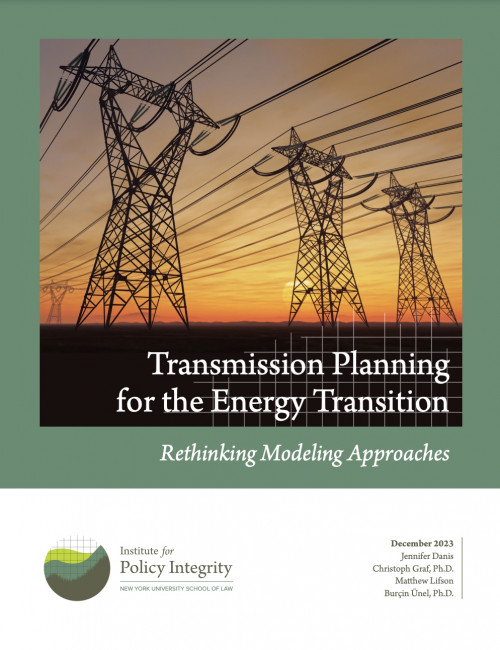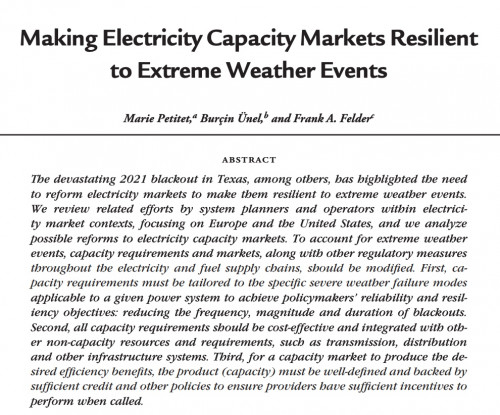-

Transmission Planning for the Energy Transition
Rethinking Modeling Approaches
This report examines the critical role of modeling details and assumptions that transmission planners frequently ignore. We first provide an overview of the wide array of choices planners have when designing traditional transmission planning models. We then discuss how planners need to rethink these choices to account for the rapidly evolving energy system and the additional uncertainties climate change brings. Finally, we present a modeling case study to show how important these modeling choices could be for transmission outcomes.
-
Comments to FERC in Support of Technical Conference on Capacity Accreditation
Policy Integrity submitted comments to FERC in support of American Clean Power Association’s petition for a technical conference on capacity accreditation. Holding a technical conference would be appropriate because accurate accreditation is becoming increasingly difficult as grids accommodate rapidly changing resource mixes with varying energy and reliability attributes, public policy constraints, and increasing/unprecedented extreme weather events. Moreover, accreditation has become more consequential, as capacity market revenues have grown to a significant share of total market payments. We included several questions that would merit discussion at the technical conference.
-
Comments to DOE on Coordination of Federal Authorizations for Electric Transmission Facilities
The Department of Energy (DOE) issued a proposed rule under 16 U.S.C. § 824p(h) to expedite the federal authorization of transmission projects. We commented in support of the proposal, including DOE's proposed requirement that project proponents describe how the transmission project would affect power-system greenhouse gas (GHG) emissions. We recommended that DOE clarify that project proponents must also estimate changes to non-power-system GHG emissions (e.g., upstream emissions of natural gas) and power-system emissions of local air pollutants. We also suggested that DOE provide additional guidance on the meaning of terms like "disadvantaged communities" and "communities with environmental justice concerns." Finally, we argued that DOE should provide an opportunity for public comment at the pre-application stage of the process.
-
Comments to PJM on the Resource Adequacy Critical Issue Fast Path
PJM Interconnection, which oversees wholesale electricity market operations for the mid-Atlantic region, is undergoing reforms to improve how the market values and prices generation capacity to ensure reliability. Policy Integrity submitted comments focused on PJM's proposed shift to a seasonal capacity market design and other proposed changes to reliability metrics.
-

Making Electricity Capacity Markets Resilient to Extreme Weather Events
The devastating 2021 blackout in Texas, among others, has highlighted the need to reform electricity markets to make them resilient to extreme weather events. In this paper, we review related efforts by system planners and operators within electricity market contexts, focusing on Europe and the United States, and we analyze possible reforms to electricity capacity markets. To account for extreme weather events, capacity requirements and markets, along with other regulatory measures throughout the electricity and fuel supply chains, should be modified. First, capacity requirements must be tailored to the specific severe weather failure modes applicable to a given power system to achieve policymakers' reliability and resiliency objectives: reducing the frequency, magnitude and duration of blackouts. Second, all capacity requirements should be cost-effective and integrated with other non-capacity resources and requirements, such as transmission, distribution and other infrastructure systems. Third, for a capacity market to produce the desired efficiency benefits, the product (capacity) must be well-defined and backed by sufficient credit and other policies to ensure providers have sufficient incentives to perform when called.
-
Amicus Brief in D.C. Circuit Opposing FERC Pipeline Approval
The Federal Energy Regulatory Commission (FERC) recently approved the construction of a new natural gas pipeline that would run through New Jersey and Pennsylvania. The gas capacity this expensive pipeline would provide, most of which will serve New Jersey markets, is unnecessary to meet the demand of New Jersey customers: the New Jersey Board of Public Utilities commissioned a study that demonstrates as much. We submitted an amicus brief in support of petitioners challenging this pipeline. In our brief, we explain that, in approving pipeline applications, FERC has abdicated its statutory responsibility to examine whether a pipeline is truly needed. Instead of determining whether a pipeline would serve the public interest, FERC defers to the assertions of profit-motivated pipeline developers and their customers. FERC's practice of approving needless pipelines is particularly concerning in light of how it regulates the development of electric transmission infrastructure, a related regulatory process. We argue that FERC should have placed greater weight on the rigorous economic study conducted by an expert state agency charged with ensuring safe and adequate gas supply for its residents.
-
Comments to DOE on National Interest Electric Transmission Corridors
The Department of Energy (DOE) issued a Request for Information regarding its program to designate National Interest Electric Transmission Corridors in areas with a need for new electric transmission capacity. We submitted comments to DOE recommending that the agency require some additional information from applicants: how a project in a designated corridor would cause power plants to increase or decrease emissions in response to the new transmission capacity and how environmental justice communities would be affected. We also recommended that DOE review applications in groups to best account for the interconnected nature of the electric grid. Finally, we recommended that DOE standardize certain modeling techniques and inputs to increase the accuracy of developers’ applications and to enable DOE to conduct apples-to-apples comparisons.
-
Comments to the NY Department of Environmental Conservation and NYSERDA on Proposed Cap-and-Invest Program
In 2019, New York’s Climate Leadership and Community Protection Act (Climate Act) was passed by the Legislature and signed by the Governor. The Climate Act set economy-wide greenhouse gas emissions limits and established the Climate Action Council. In its Scoping Plan, the Climate Action Council ultimately recommended implementation of a cap-and-invest program to meet the Climate Act’s emissions reduction requirements. In preparation for developing a proposal, DEC and NYSERDA conducted a preliminary stakeholder outreach process consisting of a series of online Stakeholder Feedback Sessions followed by an informal comment opportunity. Policy Integrity filed comments focused on the scope and structure of the stakeholder outreach process.
-
Comments to the Michigan Public Service Commission on DTE and Consumers Energy’s Proposal for a Benefit Cost Analysis Test
In 2022, as part of a multi-year MI Power Grid Initiative initiative focused on maximizing the benefits of the transition to clean, distributed energy resources, the Michigan Public Service Commission (PSC) directed specified Michigan electric utilities to file a proposal for a benefit-cost analysis (BCA) framework for use in evaluating prospective pilot programs. In February 2023, DTE Electric Company and Consumers Energy filed a BCA proposal, and on June 23, Policy Integrity submitted comments to the PSC on that propsal. Our comments made several recommendations to ensure that the BCA framework would be useful for properly weighting environmental impacts associated with proposed pilots and maximizing net benefits, including that the test ultimately adopted should incorporate Michigan’s decarbonization policy with greater specificity.
-
Ünel Named to Advisory Council for New York Electric Grid Operator
The New York Independent System Operator (NYISO) has appointed Policy Integrity’s Executive Director, Dr. Burçin Ünel, to serve on its Environmental Advisory Council. The Council provides NYISO with information, analysis, and expert perspectives on state and federal environmental policies to help it better achieve its mission of maintaining reliability of the bulk electric system and administering competitive wholesale electricity markets. In her role on the Council, Dr. Ünel will use her expertise in utility regulation and energy policy to help NYISO build and maintain New York's “grid of the future.”
Viewing recent projects in Electricity






